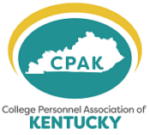We are currently accepting program proposals for the 2025 CPAK Conference. If you are interested in presenting, now is the time to submit your proposal! Also, if you could take a moment and think about your colleagues… Who has a unique area of expertise? Who is a great presenter? Who just wrapped up an interesting study or new program? Please consider sharing the proposal information with the people who come to mind! If you have any questions, please contact CPAK at kentucky@acpa.nche.edu.
Submission Deadline: January 21, 2025 @ 11:59pm EST.
Proposal Scoring Rubric: The rubric can be accessed here.
If you have any additional questions, feel free to contact the CPAK Conference Chair, Gabby Dixon, at kentucky@acpa.nche.edu.
Resources for Submitting Conference Proposals
- ACPA22 – Sample Program Proposals (contains an example of a successful program proposal and an unsuccessful program proposal).
- ACPA/NASPA Professional Competencies (CPAK proposals should align with at least one ACPA/NASPA competency area)
- Inclusive Language (as a welcoming and inclusive organization, we ask that you use equitable and inclusive practices in language and practice in your proposals and subsequent educational sessions)
- Land Acknowledgement Resources (a LA is a formal statement that recognizes and respects Indigenous Peoples as traditional stewards of this land and the enduring relationship that exists between Indigenous Peoples and their traditional territories)
- Principles of Universal Design (utilizing UD is important to increase access and inclusion for individuals with disability, nontraditional in age, and have varied learning styles).
7 Tips for Writing a Conference Program Proposal
There are three major parts to presenting at a conference: applying and submitting the program proposal, prepping once you are accepted as a “bridesmaid”, and presenting the program proposal. These major parts are broken out into separate blog posts. This first blog post will focus on tips for applying to present at a conference.
1. Bounce topic ideas off of your colleagues. Your colleagues are going to be the people who know this field best. They are going to be able to point out if a topic seems overdone or if you have a unique spin to it. You should gather together a work group, as they will provide you with honest feedback.
2. Pick a topic you are interested in. If you pick a topic you are interested in, it will be easier to do the ground work. It will also be easier to dedicate time later if your proposal is accepted for presentation.
3. Do your research. By starting your research early, you will be able to have sources to cite and more details to add into the outline and the presentation application. Research will also assist you in seeing if there are enough talking points and sources to back up your presentation.
4. Plan a way to engage with audience members. Any potential audience member will not be willing to sit through a bunch of presentations that are not interactive all day long. Having ways to interact with your audience will help them stay focused, retain respective information, and appreciate your presentation more.
5. Figure out how this topic is applicable to multiple higher education institutions. While a topic could be good in theory, it could be frustrating if the attendee listening to it cannot apply it to their current institution. As an example, think about a topic with relation to funding. If the main part of your presentation cannot be done without a lot of funding, then it is not applicable or accessible to others.
6. Be thorough and detailed with the application. Program reviewers will want to see multiple details and enough talking points for the potential allotted amount of time. It will also help, that if you are selected, to write a lesson plan and create the presentation.
7. Try to have multiple presenters on the presentation. Programming review committees like to give many people the opportunities to present. It has been my experience that if there is one proposal that has only one presenter versus another proposal that has multiple, the proposal with multiple presenters will most likely be selected. The more people who are presenting, the more ideas that can come together to benefit more student affairs practitioners.
While it can be tempting to just throw in a brief outline and answer questions in a sentence or two, the program reviewers will want to see more details. Keeping these tips in mind will aid in your endeavors as you apply to present at a conference.
 Kentucky College Personnel Association
Kentucky College Personnel Association